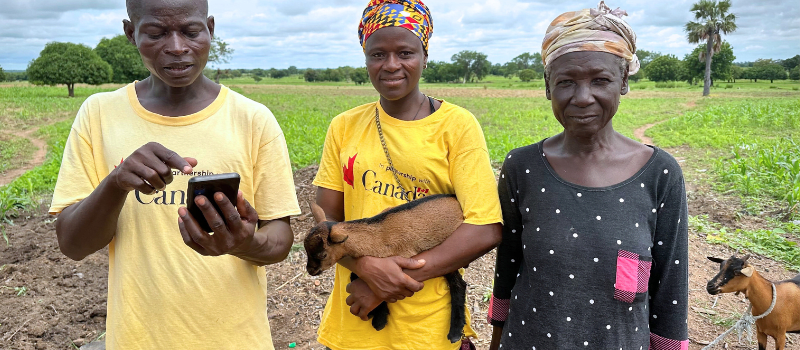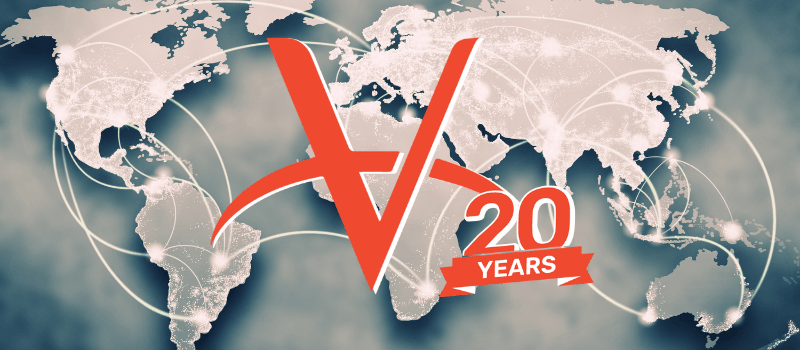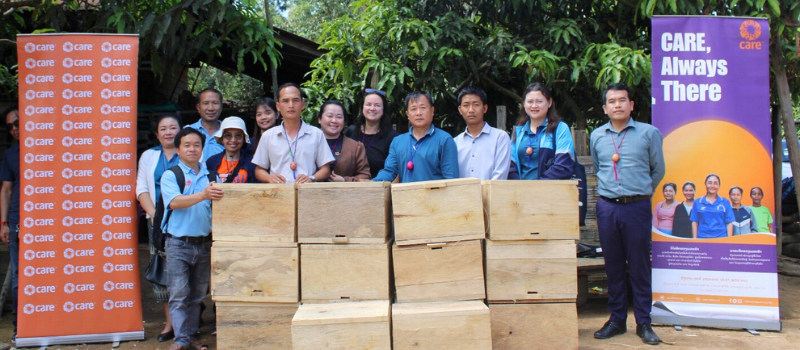Written in recognition of World Antimicrobial Resistance (AMR) Awareness Week 2024, this article by Dr. Andrea Ellis (DVM)—veterinary epidemiologist, consultant, former Senior Veterinary Advisor to Canada’s Chief Veterinary Officer/WOAH Delegate for Canada—highlights her insights as a member of the VWB North America Canadian Board of Directors.
Antimicrobial resistance (AMR) is one of the top 10 threats to human health and animal health, threatening lives, livelihoods and the global economy. If we lose the effectiveness of antimicrobials to treat infections, even basic medical care will be severely compromised. No one country or sector can solve this problem alone. Global collaboration and local actions are needed to prevent infections and preserve antimicrobials.
Understanding antimicrobial resistance
This year’s Antimicrobial Awareness Week, from Nov. 18-24, follows a very important event held on September 26, 2024 in New York City where a High-Level Meeting on Antimicrobial Resistance (AMR) was held at the 79th United Nations General Assembly (UNGA). The meeting was co-facilitated by the permanent representatives of Barbados and Malta from the Global Leaders Group on AMR and supported by the Quadripartite Joint Secretariat on AMR (QJS). The Quadripartite is a collaboration between the Food and Agricultural Organization of the United Nations (FAO), United National Environment Programme (UNEP), the World Health Organization (WHO) and the World Organisation for Animal Health (WOAH) which is advancing the One Health agenda, including on AMR. The outcome of the meeting was a political declaration approved by heads of states outlining actions and targets to tackle the persistent and growing global concerns about AMR.
To build on the momentum of the UNGA discussions, the 4th Global High-Level Ministerial Conference on AMR was held from Nov 15-16 in the Kingdom of Saudi Arabia under the theme “From Declaration to Implementation- Accelerating Actions Through Multisectoral Partnerships for the Containment of AMR”. This led to the adoption of the Jeddah Commitments, which lay collective actions to reduce AMR.
Figure: Environmental AMR pollution sources and areas for prevention and treatment action (Source: Environmental Dimensions of Antimicrobial Resistance Summary for Policymakers, UNEP 2022).
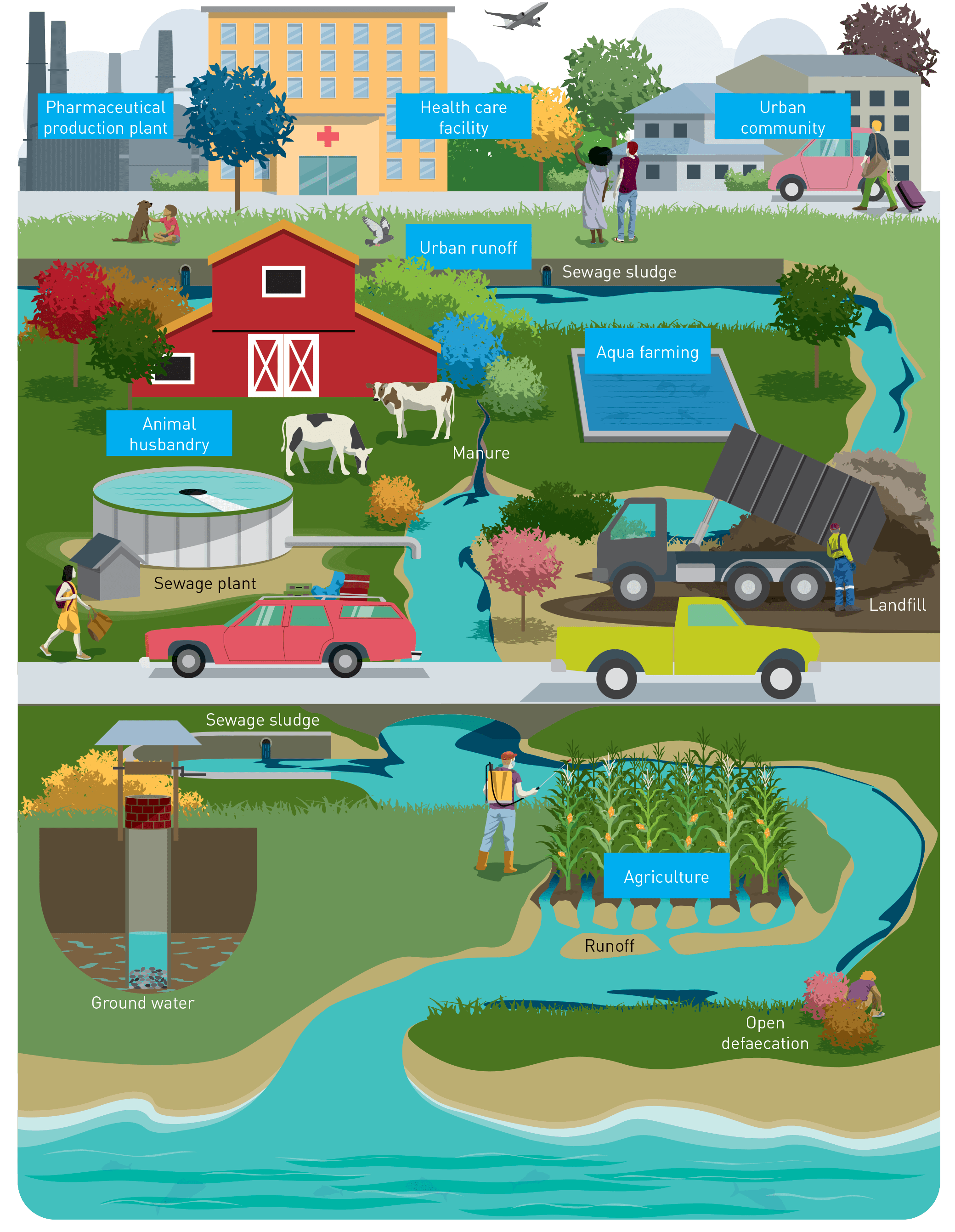
Key commitments
This was not the first discussion on AMR at the UNGA. The first was in Sept. 2016, one year after the adoption of the Global Action Plan on AMR. It was only the fourth time the UNGA had taken up a human health issue with the others being HIV, Ebola and noncommunicable diseases. The 2015 Global Action Plan on AMR called on all countries to develop national action plans to raise awareness and prompt coordinated progress to address the threat of AMR. This effort was successful, in part, as the annual Tracking Antimicrobial Resistance Country Self-Assessment survey (TrACSS) has shown that a majority of countries have multisectoral actions plans (178 countries). However, only 52 % have functioning multisectoral coordinating mechanism, and only 68 % are implementing their action plan.
Therefore, some of the key Commitments from the recent High- Level Meeting on AMR are to:
- Ensure all countries have developed or updated and are implementing multisectoral national action plans on AMR with national targets, functioning coordination mechanisms and sustainable human and financial resources by 2030.
- Reduce global deaths associated with bacterial antimicrobial resistance by 10% by 2030 against the 2019 baseline of 4.95 million deaths.
- Update the Global Action Plan on AMR by 2026 ensuring a One Health approach and biennial progress reporting from the Quadripartite.
- Formalize the standing Quadripartite Joint Secretariate on AMR as the mechanism to coordinate with other multilateral organizations on AMR.
- Organize an independent panel for evidence for action in 2025 to facilitate the generation and use of multisectoral, scientific evidence to support Member States.
- Facilitate sustainable international funding to support the implementation of national action plans on antimicrobial resistance, with the target of achieving $100 million USD to advance the goal of at least 60 per cent of countries having achieved funded plans by 2030.
Although much needs to be done and the problem of AMR has become increasingly complex, the leadership demonstrated by the Quadripartite and the increased collaboration and commitment to address AMR gives reason for hope.
When I was studying veterinary medicine over 30 years ago, antimicrobial resistance didn’t get nearly the same attention that it does now. At the time, the use of antimicrobials as growth promoters in livestock was the norm and antibiotics were often used to “cover” a patient in case of a bacterial infection. In the late 1990s and early 2000s, several countries, including Canada and the U.S., developed integrated surveillance systems to monitor antimicrobial resistance across the food chain by combining data from animals, commercially available animal products and people. These systems, National Antimicrobial Resistance Monitoring System (NARMS) in the United States and the Canadian Integrated Program for Antimicrobial Resistance Surveillance (CIPARS), while limited in the scope of pathogens, demonstrated the need for a One Health approach when gathering evidence for action to tackle AMR. Such evidence has been used to support regulatory changes on the use of antimicrobials as growth promoters in animals and to restrict prescriptions of antibiotics of medical importance for human health.
Figure: Sustainable production and consumption of antimicrobials can impact many other SDGs (Source: Bracing for Superbugs: Strengthening environmental action in the One Health response to antimicrobial resistance, UNEP 2023).
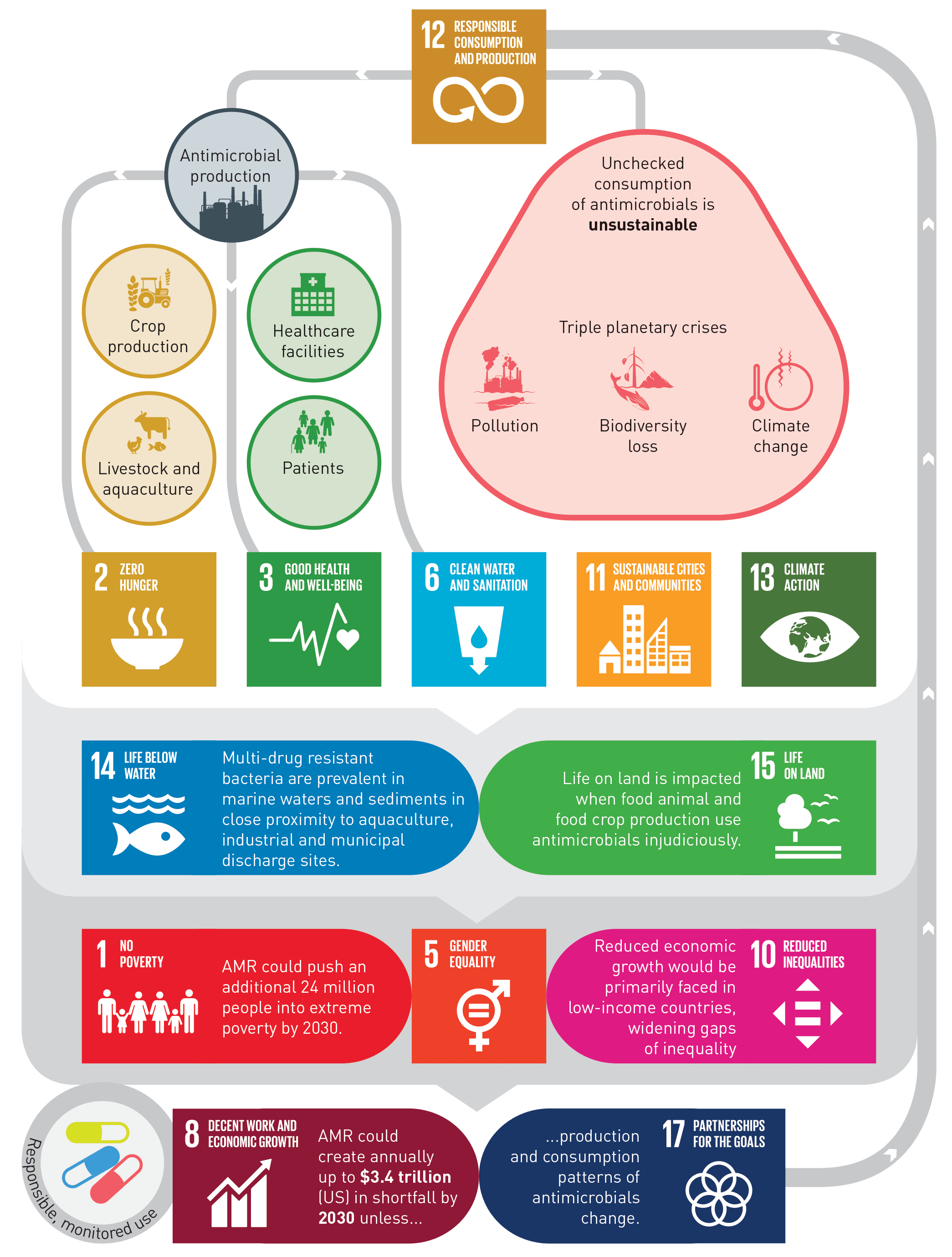
Looking ahead
An important advancement in the conversation about AMR, is the consideration of the AMR in the environment. While the environmental dimension was mentioned in the 2015 Global Action Plan on AMR, the emphasis was on reducing the use and misuse of antimicrobials in humans and animals. With the inclusion of UNEP to the Quadripartite collaboration, the environment dimension in the problem of AMR is getting more attention. A systems approach is being used and the intricate interconnections between the use of antimicrobials in humans, animals and crops and how they end up in the environment are being actively discussed. Last year, UNEP published a comprehensive report on strengthening environmental action in the One Health response to AMR. It identifies environmental hotspots for AMR and warns of AMR in the context of the overlaid threats of climate change, pollution and loss of biodiversity.
So, what can VWB do to help address the complex global problem of AMR? Like most global issues, the solutions require action at all levels. This includes strengthening One Health systems to build the resilience of communities and their livestock to prevent disease, detect illness early, and to use antimicrobials appropriately, if needed. The training of Community Animal Health Workers by VWB as a component of the fight against AMR been highlighted previously in empowering rural communities to protect the health of their herds. Improving access to clean water, better sanitation, and the use of vaccines, where appropriate, are essential preventive steps for keeping people and animals healthy thus reducing the need for antimicrobials.
The leadership and commitment of the of the Quadripartite has been critical to bringing and keeping this issue on the forefront of high-level decision makers. A whole of society approach is necessary to preserve the antimicrobials we have, prevent the development of further resistance, and ensure the most vulnerable are not left behind.
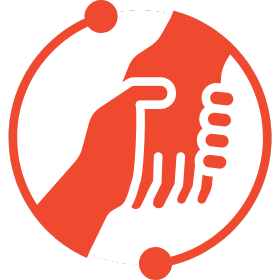 Join us in the fight against antimicrobial resistance! By supporting One Health programs, you are helping to safeguard the health of animals and humans alike. Donate, volunteer, or subscribe to support responsible animal husbandry practices, disease prevention, and antimicrobial stewardship initiatives and make a tangible difference in combating AMR.
Join us in the fight against antimicrobial resistance! By supporting One Health programs, you are helping to safeguard the health of animals and humans alike. Donate, volunteer, or subscribe to support responsible animal husbandry practices, disease prevention, and antimicrobial stewardship initiatives and make a tangible difference in combating AMR.


